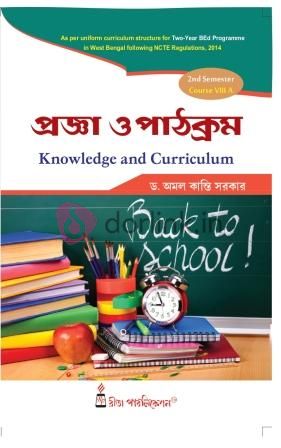×
Pragya O Pathokram [B.Ed 2nd Sem- Education]
Writer : Dr. Amal Kanti Sarker
- Shipping Time : 4 Days
- Policy : Return/Cancellation?
You can return physically damaged products or wrong items delivered within 24 hours with photo/video proof.
Contact Customer Support for return initiation and receive return authorization via email. Securely package for return.
Refunds for eligible returns are processed within 7-10 business days via Bank Transfer.
Order cancellation allowed within 24 hours of placing it. Standard policy not applicable for undamaged/wrong product cases. Detailed info. - Genre : Educational>D.El.Ed/B.Ed./M.Ed.
- Publication Year : NA
- ISBN No : NA
- Binding : No Binding Available
- Pages : NA
- Weight : NA
- Height x Width x Depth : xx Inch
MRP : ₹220.00/-
Discount : 10% Off
Your Price : ₹198.00/-
MRP is subject to change as per edition/impression by the publisher.If so, it will be notified
About the Book
Unit I: Epistemological bases of Education:
- Meaning of epistemology with reference to the process of knowledge building and generation.
- Distinction and relationship between: Knowledge and skill, Teaching and training, Knowledge and information, Reason and belief.
Unit II: Philosophical Foundation of Education:
- Significance of Philosophy in Education.
- Brief account of the tenets of the following philosophers of education –Swami Vivekananda, Gandhi, Tagore, Aurobindo, Dewey, Dr. Sarvapalli Radhakrishnan and Sir Asutosh Mukherjee.
- Relevance of the philosophy of the aforesaid philosophers in Indian education with regard to activity, discovery and dialogue.
Unit III: Sociological bases of education:
- Constitutional goal for Indian Education
- Social issues in education—Globalization, multiculturalism, secularism, education for sustainable development
- Nationalism, universalism and secularism—their interrelationship with education
- Illiteracy, poverty, socially disadvantaged groups gender inequality
Unit IV: Concepts and scope of education:
- Four pillars of education.
- Aims of education: Personal, Social, Economic and National Development
- Education for generation, conservation and transmission of knowledge
- Agencies of education: home, school, community and media
- Types of education: formal, non-formal, informal and role of their agencies
Unit V: Concept of Curriculum:
- Meaning, Characteristics & types of Curriculum
- Nature & Scope of Curriculum
- Necessity of Curriculum
- Principles of framing curriculum
- Role of State in curriculum
- Constitutional values and national culture in curriculum

